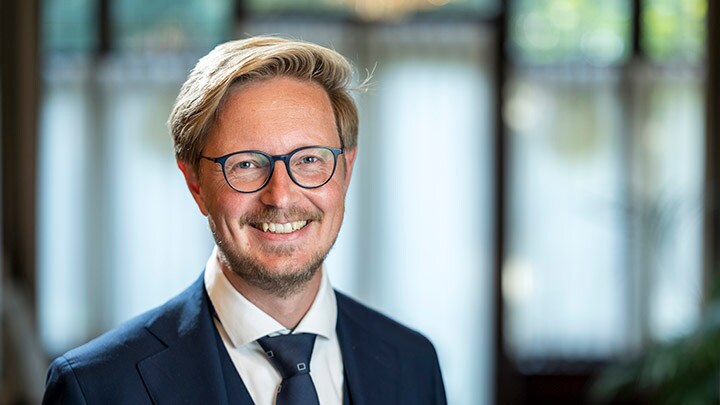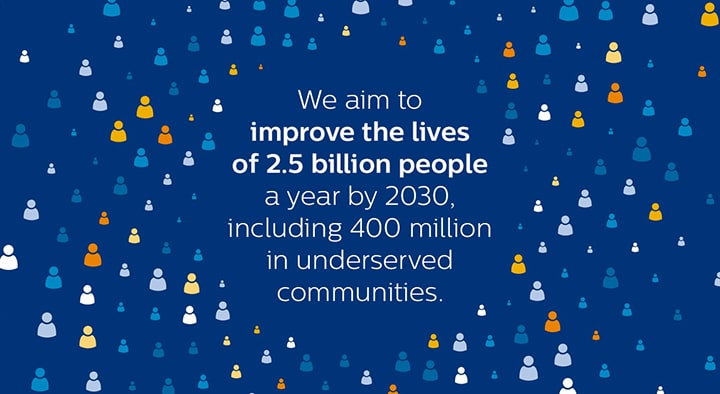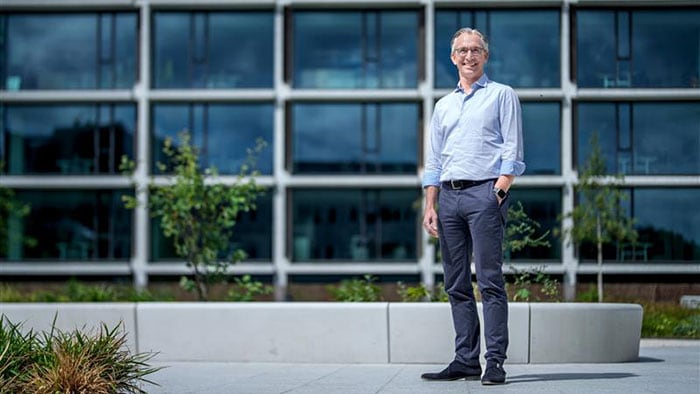Philips is als eerste gezondheidstechnologiebedrijf wereldwijd volledig CO2-neutraal. Ook komt 100 procent van onze elektriciteit uit hernieuwbare bronnen. Van alle verkopen bestaat 70 procent uit groene producten en diensten, 15 procent uit circulaire inkomsten. Van het bedrijfsafval wordt 90 procent gerecycled en niks naar stortplaatsen gebracht. Bovendien: in 2020 hebben de producten en oplossingen van Philips het leven van 1,53 miljard mensen wereldwijd verbeterd en we hebben de ambitie om dat in 2030 naar 2,5 miljard mensen te tillen. Het zal duidelijk zijn; duurzaamheid nemen we bij Philips serieus. Sterker nog, het is integraal onderdeel van onze strategie. Onze ambities worden uitgedrukt in tastbare, meetbare beloftes, die we voortdurend bijhouden en waarover op vaste momenten over wordt gerapporteerd.
Maar waarom stellen we deze targets? En hoe bereken je eigenlijk het aantal mensenlevens dat je verbetert als bedrijf?
Een betere wereld in 2030
Robert Metzke, Global Head of Sustainability: “We hebben geen duurzaamheidsstrategie, maar een duurzame strategie. Wil je als bedrijf succesvol zijn, dan moet je begrijpen waar de maatschappij naartoe wil. Om die vragen te beantwoorden, moeten we eerst kijken naar het grote plaatje.” De Verenigde Naties hebben 17 duurzame ontwikkelingsdoelen opgesteld, de zogeheten Sustainable Development Goals; de SDG’s. De ambitie van de VN en veel overheden, bedrijven en organisaties die zich aan deze doelstellingen committeren, is dat we er samen naar streven om de wereld in 2030 een betere plek te maken. En dat dus op 17 verschillende gebieden.

Philips richt zich met name op drie van deze doelen: een goede gezondheid & welzijn, verantwoordelijke consumptie & productie en klimaatactie. Deze hebben we geselecteerd, omdat dit de onderdelen zijn waar we verwachten als bedrijf de grootste positieve impact te kunnen maken op een betere toekomst. Als je je committeert aan deze doelen, dan moet je ook hard maken hoe je dat gaat doen. Daarom hebben we bij meetbare en kwantificeerbare doelen aan de SDG’s gehangen. En die worden ook extern gecontroleerd. Jaarlijks checken we met onze stakeholders volgens een vaste methodologie wat zij verwachten en waar wij verschil kunnen maken. Ook delen we in ons jaarverslag wat we hebben gedaan, zodat stake- en shareholders inzicht krijgen in wat we daadwerkelijk hebben bereikt.”

En dat is niet voor niets: in 2021 scoorde Philips 90 op 100 voor ESG-prestaties in de S&P Global Ratings - de hoogste rating die het bedrijf tot nu toe heeft toegekend.
Hoe meet Philips verbeterde levens?
Een belangrijke target binnen Philips is het aantal levens die we verbeteren. Hoe wordt dat getal berekend? Voor grote medische apparatuur - zoals een van onze CT- of MRI-systemen - hanteren we dezelfde aanpak om een totaal aantal verbeterde levens te genereren. Wij bepalen het gemiddelde aantal unieke patiënten dat elk jaar per systeem wordt gediagnosticeerd. Deze statistieken worden voor alle Philips-producten en -oplossingen per markt gegenereerd en bijgehouden, zodat we het aantal door ons beïnvloede levens kunnen kwantificeren. Vervolgens passen we een statistisch model toe om dubbeltellingen te voorkomen; als iemand meerdere Philips-producten gebruikt, thuis of in het ziekenhuis, dan telt deze toch als één persoon. Onze maatschappelijke impact wordt dus uitgedrukt in het totale aantal levens dat per land is verbeterd.
Dit doen we door actieve producten en oplossingen te vermenigvuldigen met het aantal mensen dat met elk product of oplossing in aanraking komt. Een gemiddelde Sonicare tandenborstel wordt bijvoorbeeld gemiddeld vier jaar lang door één persoon gebruikt. In die periode gaat het om één leven.
Mensen achter de cijfers
“Deze berekening helpt ons om onze maatschappelijke impact te meten, bruikbare inzichten te genereren en – daar gaat het uiteindelijk om – zo veel mogelijk maatschappelijke waarde te creëren”, aldus Robert. “Het meetbaar maken van deze maatschappelijke impact zorgt er voor dat alle Philips-collega’s wereldwijd hetzelfde doel hebben. Mensen in alle delen van de organisatie delen diezelfde missie, om mensenlevens te verbeteren, en voelen deze ook heel sterk.”
Het meetbaar maken van deze maatschappelijke impact zorgt er voor dat alle Philips-collega’s wereldwijd hetzelfde doel hebben. Mensen in alle delen van de organisatie delen diezelfde missie, om mensenlevens te verbeteren, en voelen deze ook heel sterk.
Robert Metzke
Global Head of Sustainability
“Dat is het mooie van onze methodiek; door maatschappelijke impact en duurzaamheidsambities in hele begrijpelijke cijfers uit te drukken, voelt een team van 77.000 mensen wereldwijd de drive om daar elke dag een bijdrage aan te leveren. Want uiteindelijk zijn het onze collega’s die, ieder op haar of zijn eigen manier, ervoor gaan zorgen dat we onze beloftes waarmaken en dus de wereld in 2030 een betere plek maken.” In de serie Duurzaam Doen gaan we op zoek naar de verhalen en gezichten achter de duurzaamheidsdoelstellingen van Philips. Wie zijn de mensen die er elke dag voor zorgen dat de ambities op het gebied van goede gezondheid & welzijn, verantwoordelijke consumptie & productie en klimaat worden gehaald?

Measuring social impact: how does Philips improve 2.5 billion lives?
Philips is the first healthcare technology company worldwide to be completely carbon neutral. Also, 100 percent of our electricity comes from renewable sources. Of all sales, 70 percent are green products and services and 15 percent of revenues are circular. 90 percent of the company's waste is recycled and none is sent to landfills. In 2020 Philips' products and solutions will have improved the lives of 1.53 billion people worldwide and our ambition is to improve the lives 2.5 billion people by 2030. Sustainability is at the core of our business at Philips and integral part of our strategy. Our ambitions are expressed in tangible, measurable commitments, which we constantly monitor and report on. But why do we set these targets? And how do you actually calculate the number of lives we improved?
A better world in 2030
Robert Metzke, Global Head of Sustainability at Philips: "We do not have a sustainability strategy, our strategy is sustainable. If you want to be successful as a company, you have to understand what society wants. Therefore we must first look at the big picture.” The United Nations has established 17 Sustainable Development Goals; the SDGs. The ambition of the UN and many other governments, companies and organizations committing to these goals is that together we can make the world a better place in 2030.

Philips has a particular focus on three of these goals: good health & well-being, responsible consumption & production and climate action. We selected these because they are the areas where we, as a company, expect to be able to make the biggest positive impact towards a better future. If you commit to these goals, you also have to demonstrate how you are going to do so. That is why we have attached measurable and quantifiable goals to the SDGs. And they are also externally verified. Every year, according to a fixed methodology, we check with our stakeholders what they expect and where we can make a difference. We also share what we have done in our annual report, so that stakeholders and shareholders can see what we have actually achieved.

And for good reason: in 2021, Philips scored 90 out of 100 for ESG performance in the S&P Global Ratings - the highest rating the company has awarded to date.
How do we measure how many lives we improved?
A key target at Philips is the number of lives we improve. How do we calculate this number? We do this by multiplying active products and solutions by the number of people that each product or solution touches. For example, an average Sonicare toothbrush is used by one person for four years. In that period, it represents one life. For large medical devices - such as one of our CT or MRI systems - we use the same approach to generate the total number of lives improved. We determine the average number of unique patients that are diagnosed each year with the system. These statistics are generated and tracked for all Philips products and solutions by market, so we can quantify the number of lives we are impacting. We then apply a statistical model to avoid double counting; if someone uses several Philips products, at home or in the hospital, they still count as one person. So our social impact is expressed in the total number of lives improved per country.
People behind the numbers
"This calculation helps us measure our social impact, generate actionable insights and - that's what it's all about in the end - create as much social value as possible," says Robert. "Making this social impact measurable ensures that all Philips colleagues around the world have the same goal. People in all parts of the organization share the same mission, to improve people's lives, and we all feel it very strongly."
Making this social impact measurable ensures that all Philips colleagues around the world have the same goal. People in all parts of the organization share the same mission, to improve people's lives, and we all feel it very strongly.
Robert Metzke
Global Head of Sustainability
"That is the beauty of our methodology; by expressing social impact and sustainability ambitions in very understandable figures, a team of 77,000 people worldwide feel the drive to contribute to this goal every day. Because ultimately, our colleagues, each in their own way, ensure that we fulfil our promises and make the world a better place in 2030." In the series Sustainability in Action, we explore the stories and people behind Philips' sustainability goals. Who are the people who make sure every day that Philips’ ambitions in the areas of good health & well-being, responsible consumption & production and climate are met?













